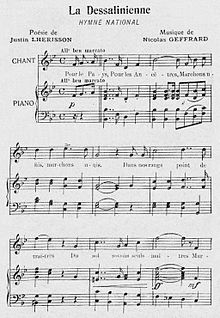| English: 'The Dessaline' | |
|---|---|
 Sheet music Sheet music | |
National anthem of Haiti | |
| Also known as | Desalinyèn (Haitian Creole) |
| Lyrics | Justin Lhérisson, 1903 |
| Music | Nicolas Geffrard, 1903 |
| Adopted | January 1, 1904 (1904-01-01) |
| Audio sample | |
"La Dessalinienne" (pronounced [la dɛsalinjɛn]; lit. ''The Dessaline'') is the national anthem of Haiti. This march was written by Justin Lhérisson and composed by Nicolas Geffrard.
Etymology
"La Dessalinienne" is named in honor of Haiti's revolutionary leader and first ruler Jean-Jacques Dessalines. The title was suggested by historian Clément Lanier.
History
To commemorate the 100th anniversary of the Haitian Revolution, a competition was held for a national anthem in 1903. The poetic words of Justin Lhérisson and martial composition of Nicolas Geffrard won over the judges, who preferred it to "L'Artibonitienne" by Capois diplomat Louis Edouard Pouget.
The anthem was premiered at an October 1903 celebration of the Armée Indigène's entry into Port-au-Prince organised by the Association du Petit Théâtre. It was sung by Auguste de Pradines, also known as Kandjo. The text and music were printed at Bernard's in Port-au-Prince and distributed throughout the country during the week. It was officially adopted as the national anthem in 1904.
Lyrics
As a one-verse rendition can be relatively short, a common way to lengthen a performance is to perform an abridged arrangement consisting of the first verse immediately followed by the last.
Official lyrics
| Literal translation | |||||
|---|---|---|---|---|---|
|
For the Country, for the Ancestors, |
Unofficial lyrics
A Haitian Creole version was created by Raymond A. Moise, and Haitian singer Ansy Dérose (1934–1998) helped popularize it in 1980. Although it became widely accepted, it is not official.
| Literal translation | |||||
|---|---|---|---|---|---|
|
For Haiti, the Country of the Ancestors |
See also
Notes
- See Help:IPA/French, French phonology, and Haitian French.
- See Help:IPA/Haitian Creole and Haitian Creole § Orthography.
- ^ (pou nou)
- (mitan nou)
- (li ki)
- ^ (Pou nou)
- (sa ki)
- Sometimes written bòt ('boot').
- (Pou li)
- (renmen li)
- (respekte li)
References
- ^ "Haitian Patriotic Songs". Archived from the original on 2013-12-31. Retrieved 2014-02-05.
- Malena Kuss. Music in Latin America and the Caribbean: Volume 2 Performing the Caribbean Experience - An Encyclopedic History. The Universe of Music Inc. p. 260. ISBN 978-0-292-70951-5.
- Olsen, Dale A.; Sheehy, Daniel E. (2014). The Garland Handbook of Latin American Music. Routledge. p. 139. ISBN 9780415961011. Retrieved 9 June 2015.
- ^ "6130.- Symboles d'Haiti: Hymne National » Haiti-Référence". Haiti-Référence (in French). Retrieved 2022-01-25.
- ^ Hall, Michael R. (2012). Historical Dictionary of Haiti. Scarecrow Press. p. 182. ISBN 9780810878105. Retrieved 9 June 2015.
- Averill, Gage (1997). A day for the hunter, a day for the prey: Popular music and power in Haiti. Chicago, Ill.: University of Chicago Press. ISBN 9780226032931.
- "National Anthem". Embassy of Haiti. Retrieved 2022-01-25.
- Shaw, Martin; Coleman, Henry (1963). National Anthems of the World. Blandford Press. p. 160.
- ^ "6140.- Im nasyonal Dayiti » Haiti-Référence". Haiti-Référence (in French). Retrieved 2022-01-25.
- Bon nouvèl (in Haitian Creole). Lafalanj. 1980. p. 20.
- Savain, Roger E. (1995). Dis pa nan lang ayisyen-an (in French). Schenkman Books. p. 107. ISBN 978-0-87047-106-3.
- Pour que la mémoire--: Père de la Patrie, 20 septembre 1758-17 octobre 1806. Jean-Jacques Dessalines (in French). Editions des Presses Nationales d'Haïti. 2001. p. 6. ISBN 978-99935-37-08-3.